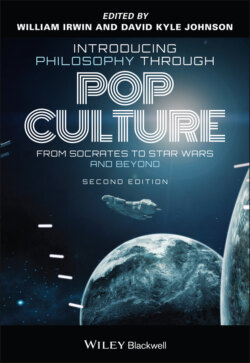Читать книгу Introducing Philosophy Through Pop Culture - Группа авторов - Страница 27
“If Chewbacca Lives on Endor, You Must Acquit”
ОглавлениеAt times, checking to see if conclusions follow from premises and if premises are true can be very difficult. Some words have multilevel meanings. And some people will try to convince us of the truth of claims in order to deceive us, or sell us something, or get us to vote for them, or become part of their group, or share their ideology. Often, people will try to convince us that a conclusion follows from a premise or premises when, in fact, it does not, kind of like what the cartoon Cochran does with the Chewbacca defense in the episode, “Chef Aid,” a satire of Cochran's actual closing arguments in the O.J. Simpson case.
In the episode, Alanis Morissette comes out with a hit song “Stinky Britches,” which, it turns out, Chef had written some 20 years ago. Chef produces a tape of himself performing the song, and takes the record company to court, asking only that he be credited for writing the hit. The record company executives then hire Cochran. In his defense of the record company, Cochran shows the jury a picture of Chewbacca and claims that, because Chewbacca is from Kashyyyk and lives on Endor with the Ewoks, “It does not make sense.” Cochran continues: “Why would a Wookie, an eight‐foot‐tall Wookie, want to live on Endor with a bunch of two‐foot‐tall Ewoks? That does not make sense … If Chewbacca lives on Endor, you must acquit! The defense rests.” The jury is so convinced by Cochran's “argument,” that not only do they apparently deny Chef's request for credit recognition but they also find Chef guilty of harassing a major record label, fining him $2 million to be paid within 24 hours. Friends of Chef then organize “Chef Aid” to pay his fine.
We laugh at Cochran's defense because it has absolutely nothing to do with the actual case. We laugh all the more at the absurdity when the Chewbacca defense is also used to find Chef guilty of harassing the very record company that had produced a stolen song. The issue of Chewbacca living on Endor has absolutely nothing to do with, and is in no way logically related to, the issues of whether Chef should receive credit for the song, or whether he has harassed the record company. As rational thinkers, we recognize this, laugh at the absurdities, and wonder why anyone in their right mind would be convinced that the Chewbacca defense and the other issues are related.
As we have seen in Section 2.1, logicians have a special term for these bad arguments in which the conclusion does not follow from a premise. They call it a fallacy, and a fallacy occurs when we inappropriately or incorrectly draw a conclusion from reasons that do not support the conclusion. Fallacies are so common that logicians have names for different types of fallacies.
The Chewbacca defense is an example of a red herring fallacy, which gets its name from a police dog exercise in which police officers, while trying to discern the best trail hunters, use strong‐smelling red herring fishes in an attempt to throw dogs off the trail of a scent. In a red‐herring fallacy, someone uses claims and arguments that have nothing to do with the issue at hand in order to get someone to draw a conclusion that they believe to be true. So, the claims and arguments are the “red herrings” they use to throw you off the “trail” of reasoning that would lead to another, probably more appropriate, conclusion altogether. In the episode “Weight Gain 4000,” Wendy seems to have a legitimate complaint that Cartman cheated to win the essay contest, but people refuse to draw that conclusion given that they are diverted by the idea of Kathy Lee Gifford coming to town. Even after Wendy produces the evidence that Cartman had really handed in a copy of Walden as his essay, they simply do not care about drawing the conclusion that Cartman had cheated. In a lot of South Park episodes, people are thrown off the track of issues or arguments by other circumstances or events that capture their attention. This is a humorous way for Trey and Matt to make their points about people's faulty and crazy reasoning.
